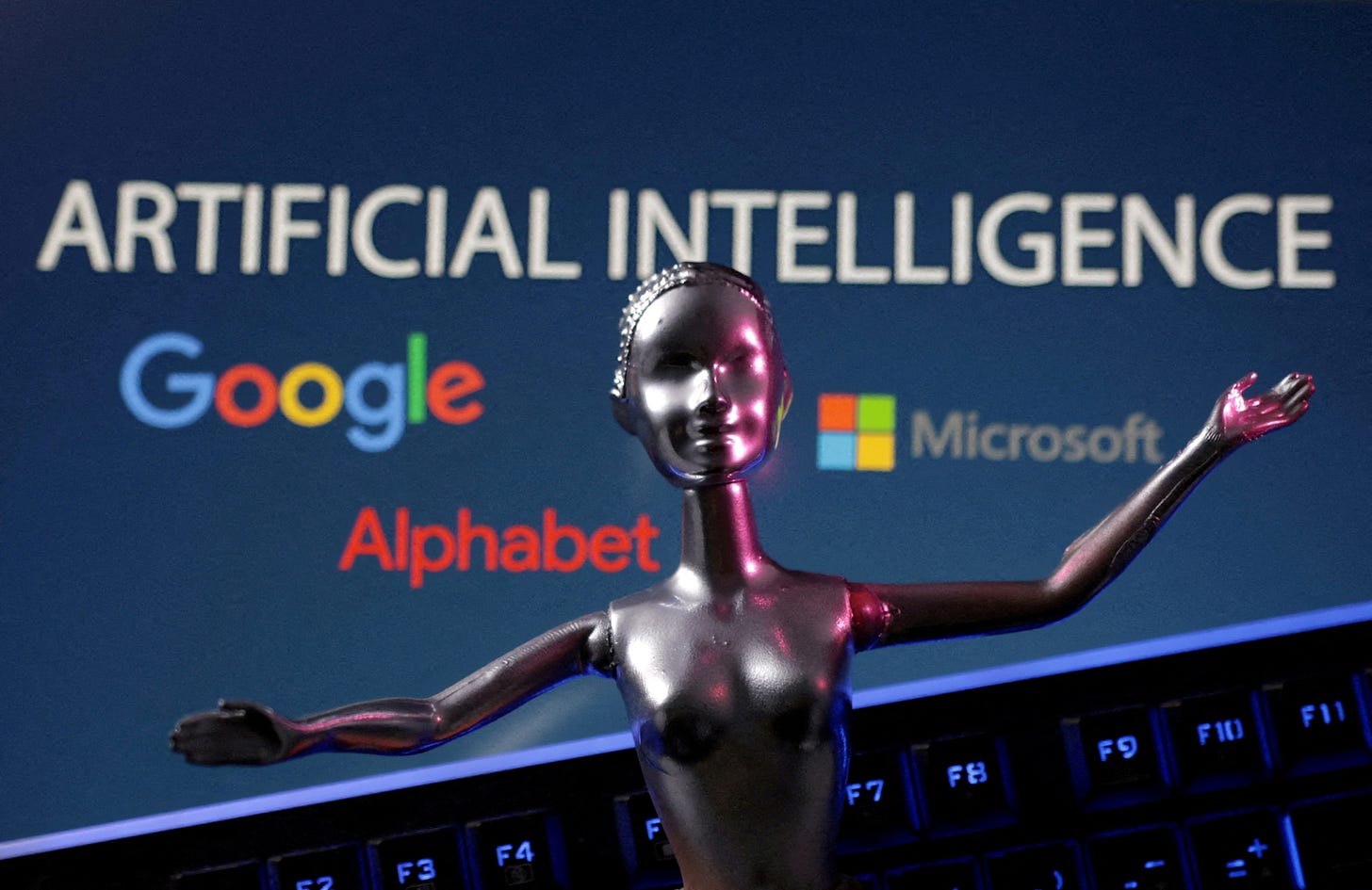AI Takes Center Stage: A Whirlwind of Announcements and Developments
The AI Superpowers Battle for Dominance as Revolutionary Technologies Emerge
The world of artificial intelligence has been absolutely electric these past few weeks, with a flurry of major announcements and impressive technological demonstrations from the leading players in the field. If you felt like you could barely keep up with all the AI news, you're not alone. Let's take a deep dive into the biggest headlines and explore what may lie ahead.
OpenAI Kicks Things Off with GPT-4 Unveiling
It all started with OpenAI's Spring Update, where they revealed their latest marvel – GPT-4. This new AI model, codenamed GPT-4 Omni due to its multimodal capabilities, represents a significant leap forward. Not only is it much faster than its predecessor, but it can understand and generate audio, images, video, and nearly any other data format you can throw at it.
But the real showstopper was GPT-4's conversational abilities. The demos were reminiscent of the Spike Jonze film "Her," with the AI assistant's voice bearing an uncanny resemblance to Scarlett Johansson's disembodied operating system. From helping users calm their nerves before presentations to solving complex math problems step-by-step using visuals, GPT-4 showcased an unprecedented level of contextual awareness and problem-solving prowess.
Perhaps the most exciting part? OpenAI announced that all these cutting-edge GPT-4 capabilities would be made available to free ChatGPT users – a remarkable move that democratizes access to some of the world's most advanced language technology.
Google Fires Back with a Torrent of AI Announcements
Not to be outdone, Google took the stage at their annual I/O event just days later, unleashing a veritable tsunami of AI announcements and product updates. From new AI models like Gemini 1.5 Flash and 1.5 Pro to mind-bending demos of their "Project Astra" technology that allowed phones to understand their visual surroundings, Google left no stone unturned.
One of the standout moments was the unveiling of an intelligent call screening feature that can detect potential scam calls and warn users in real-time. Another highlight was the introduction of "Veo" – Google's impressive new video generation model that appears to be a formidable rival to the acclaimed Sora AI.
While OpenAI opted for a more focused event, Google's approach was a full-scale blitzkrieg, with the company revealing roughly 100 new AI-powered features and products spanning their entire ecosystem. From Gmail to Google Search, nearly every Google service is receiving an AI upgrade, ushering in a new era of intelligent, context-aware computing experiences.
Behind the Scenes: Key Personnel Shifts at OpenAI
Amidst the excitement of new product launches, some major personnel changes were afoot at OpenAI. In a surprising move, Ilya Sutskever, one of the company's co-founders and Chief Scientist, announced his departure after nearly a decade at the helm.
While Sutskever left on good terms, expressing confidence in OpenAI's ability to develop safe and beneficial artificial general intelligence (AGI) under the leadership of Sam Altman, Greg Brockman, and Mira Murati, his exit raised eyebrows. Speculation mounted that Sutskever's research-centric background may have clashed with OpenAI's increasingly commercial direction.
Sutskever's departure was soon followed by the resignations of several key members of OpenAI's Alignment team – the group tasked with ensuring AI systems remain safe and beneficial. This exodus has sparked concerns among some observers about OpenAI's commitment to addressing the potential risks posed by advanced AI systems.
The Future of Dating, Powered by AI Concierges
In a surprising twist, the world of online dating may soon be revolutionized by AI assistants. During a recent interview, Whitney Wolfe Herd, the founder of the dating app Bumble, floated the idea of "AI dating concierges" – intelligent agents that would go on virtual dates with each other to assess compatibility between human users.
According to Wolfe Herd's vision, your AI concierge could scan entire cities, engage in initial conversations with other users' AI assistants, and present you with a curated selection of highly compatible matches. While the concept may seem straight out of a Black Mirror episode, it highlights the boundless potential of AI to reshape virtually every aspect of our lives, including the deeply personal domain of romantic relationships.
Meta Explores AI-Powered Earphones with Cameras
Not to be left behind, Meta (formerly Facebook) is reportedly exploring the development of AI-assisted earphones equipped with cameras. While details are scarce, these earbuds could potentially offer similar capabilities to Meta's Ray-Ban Stories glasses – allowing the AI assistant to "see" and understand the user's surroundings, enabling more contextual and visually-aware interactions.
Such a product would represent a significant step towards true ambient computing, where intelligent assistants seamlessly integrate into our everyday lives, augmenting our experiences and capabilities in real-time. However, as with any camera-equipped device, privacy concerns are likely to arise – a challenge Meta and other tech giants will need to navigate carefully.
Looking Ahead: A Packed Calendar of AI Events
The flurry of AI announcements is showing no signs of slowing down, with a packed calendar of industry events on the horizon. Next up is Microsoft Build, the company's annual developer conference, where we can expect a deluge of AI-infused product updates and integrations.
Given Microsoft's close partnership with OpenAI and their substantial investment in the company, it's highly likely that we'll see GPT-4 capabilities woven into various Microsoft products and services, potentially including the popular GitHub Copilot coding assistant.
Beyond Microsoft Build, tech titans like Cisco, Qualcomm, and Apple all have major events scheduled in the coming weeks and months, each promising their own AI-focused reveals and showcases. As the industry continues its relentless march towards increasingly intelligent and capable systems, we can expect the pace of innovation – and the accompanying hype – to reach fever pitch.
The AI Revolution: Opportunities and Challenges
As we bear witness to this unprecedented wave of AI breakthroughs, it's crucial to consider both the immense opportunities and the potential challenges that lie ahead. On the positive side, the democratization of cutting-edge language models and the infusion of AI into virtually every aspect of computing hold the promise of radically enhancing our productivity, creativity, and problem-solving abilities.
However, concerns around privacy, security, and the broader societal impacts of increasingly powerful AI systems cannot be ignored. From the potential for job displacement to the existential risks posed by a hypothetical superintelligent system run amok, the development of advanced AI carries weighty ethical and philosophical quandaries that must be carefully navigated.
As we stand on the precipice of an AI-driven paradigm shift, it's incumbent upon all stakeholders – tech companies, policymakers, ethicists, and the general public – to engage in open and honest dialogue. By working together to establish robust governance frameworks and instill a culture of responsible AI development, we can strive to harness the transformative potential of this technology while mitigating its risks.
In the weeks and months ahead, the AI revolution will undoubtedly continue to captivate our attention, challenging our preconceptions and pushing the boundaries of what we thought possible. Buckle up and brace yourselves – the future of intelligent machines is unfolding before our very eyes, and the possibilities are limited only by our imagination and our collective wisdom.






